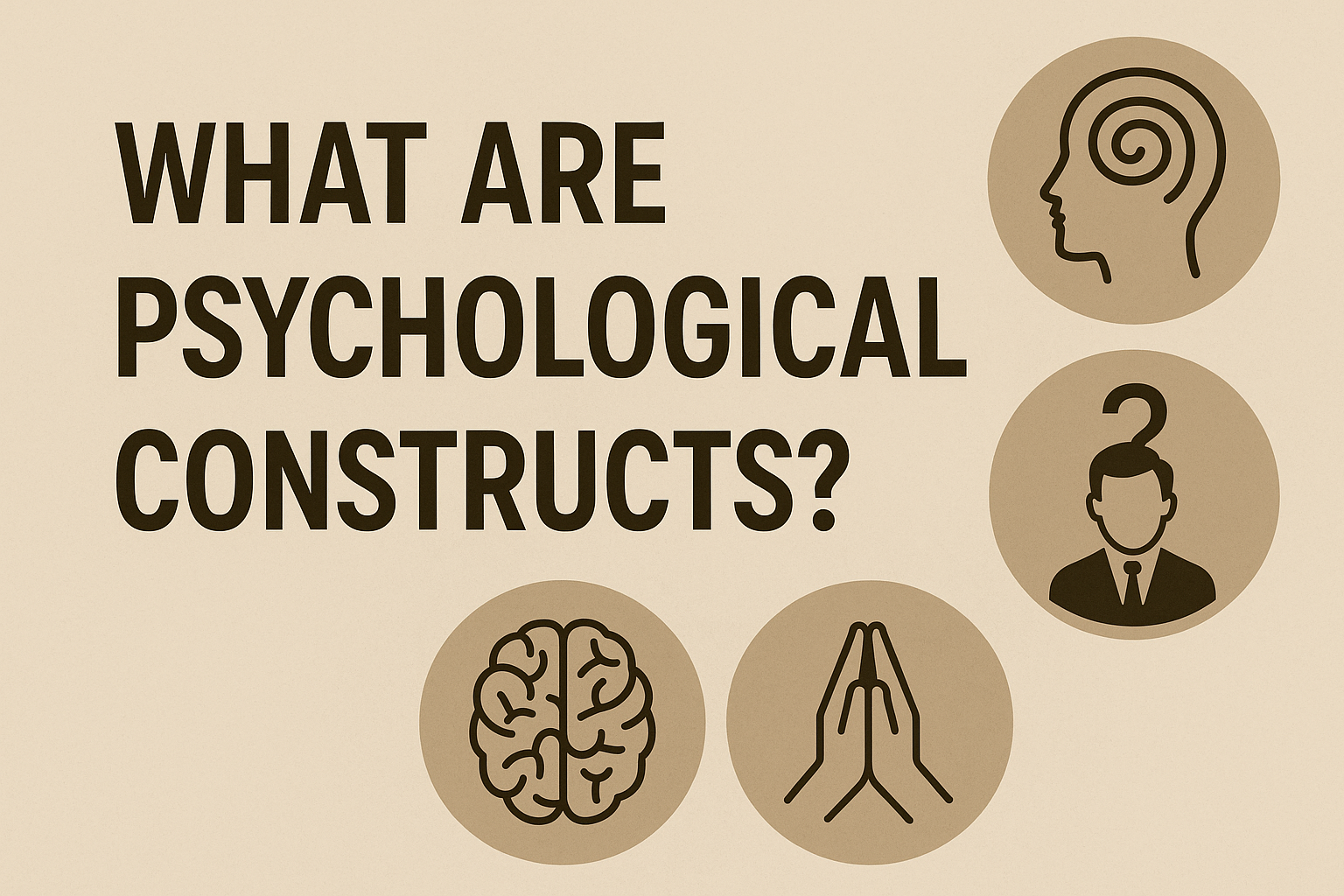Your thoughts, emotions, and sense of self are shaped by invisible frameworks called psychological constructs.
Although these constructs can feel abstract, they play a pivotal role in how you perceive the world and respond to it.
By understanding these constructs, you can unlock the power to shape your behavior, align your life with your values, and even rewire outdated patterns to foster personal growth.
This blog explores what psychological constructs are, how specific constructs like self-esteem, values, and beliefs influence you, and why self-awareness is crucial in identifying and reshaping constructs.
What Are Psychological Constructs?
Psychological constructs are theoretical tools used by psychologists to understand and measure aspects of human behavior and thought processes.
They simplify abstract mental phenomena—like emotions, motivations, and identity—into something that can be studied and described scientifically.
Examples include self-esteem, intelligence, personality traits, values, and beliefs.
Key Characteristics of Psychological Constructs:
- Abstract Nature: Constructs describe intangible elements, like confidence or happiness.
- Personal and Universal: While constructs are unique to each individual, the way they operate shares commonalities across all humans.
- Dynamic: Constructs are not static. They evolve with life experiences, societal influences, and deliberate personal growth.
Why They Matter
Psychological constructs serve as the “blueprint” for how you think, feel, and act:
- They frame how you interpret both internal and external events.
- They influence your emotional responses and coping mechanisms.
- They shape your identity and interactions with others.
Understanding these constructs is key to demystifying why you are the way you are—and how you can change if desired.
How Psychological Constructs Shape Thoughts, Emotions, and Identity
The constructs governing your inner world have a profound influence on how you process information, interact with others, and view yourself.
1. Shaping Your Thoughts
Your patterns of thinking often stem from ingrained constructs developed over years. For instance:
- Beliefs dictate how you interpret events. A core belief like “I’m not capable” might lead you to shy away from challenges.
- Schemas, which are mental frameworks based on past experiences, guide your perceptions of people and situations.
Example:
If someone holds a belief that “success requires talent, not effort,” this construct may discourage persistence in the face of failure. On the other hand, shifting to a belief that “effort matters more than talent” can transform their approach to challenges.
2. Influence on Emotional Responses
Constructs significantly drive your emotional reactions to situations:
- Low self-esteem might lead to feelings of inadequacy, even when compliments are given.
- Cultural values around achievement and success can lead to guilt or pressure if those expectations aren’t met.
Example:
If your concept of “failure” is deeply tied to self-worth, even small setbacks may trigger anxiety or sadness. But redefining failure as a learning opportunity can foster resilience and positivity.
3. Forming Your Identity
At the center of your identity are constructs like:
- Self-concept (how you perceive yourself)
- Core values (guiding principles that define what’s important to you)
- Social roles (e.g., being a parent, artist, or friend)
Example:
Someone raised in a household valuing community service might construct an identity centered around being a helper, shaping their career, relationships, and daily decisions.
Interaction Between Constructs and Context
The interaction between identity constructs and context is dynamic and ongoing. While self-concept, core values, and social roles form the foundation of your identity, these elements are continuously influenced by external factors such as cultural norms, life experiences, and social expectations.
For example, someone who identifies strongly as a caregiver may adapt their identity over time based on the needs of those around them, such as aging parents or young children.
Similarly, encountering new environments or challenges—like moving to a different country or starting a new career—can prompt a reevaluation of core values or shift the way social roles are prioritized.
Context also plays a significant role in how different facets of identity are expressed. An individual might prioritize their role as a professional in a workplace setting, while leaning more into their role as a parent at home, yet both roles remain integral to their overall identity.
This fluid interaction highlights the importance of adaptability and self-awareness in navigating identity construction, as it allows individuals to align their sense of self with their evolving circumstances and goals.
Major Psychological Constructs That Shape You
Understanding key constructs can help you see how these abstract concepts shape your everyday experiences. Here are the most influential ones.
1. Self-Esteem
Self-esteem refers to the regard you have for yourself. It impacts:
- Your confidence in decision-making
- The types of relationships you pursue
- How you handle criticism or failure
Low self-esteem can lead to avoidance behaviors or dependency on external validation. High self-esteem, when balanced, supports healthy risk-taking and emotional resilience.
Building Self-Esteem:
- Practice self-compassion.
- Celebrate small victories.
- Challenge negative self-talk with objective evidence.
2. Values
Values are deeply held principles guiding your priorities and actions. They influence:
- Career paths you pursue
- Ethical standards in decision-making
- Relationships and lifestyle choices
3. Beliefs
Beliefs, particularly those developed early in life, inform how you interpret the world. For example:
- A belief in scarcity (“there’s never enough to go around”) might drive hoarding behaviors.
- A belief in abundance (“there’s enough for everyone”) encourages generosity and trust.
4. Personality Traits
Personality traits like openness, conscientiousness, and extroversion derive from psychological constructs. They shape the way you approach new experiences, relationships, and challenges.
5. Identity Constructs
These involve various dimensions of self-perception, including:
- Ethnic or cultural identity: How connected you feel to your heritage.
- Gender identity: Your personal sense of being male, female, or beyond traditional categories.
- Social identity: How your membership in groups (e.g., profession, religion, clubs) forms part of your self-concept.
The Importance of Self-Awareness in Identifying Outdated Constructs
To create meaningful change in your life, it’s essential to examine your existing constructs and decide whether they serve your current aspirations.
Why Constructs Can Become Outdated
- Life circumstances change, but old constructs, like outdated software, may remain fixed.
- Emotional trauma or societal conditioning may lead to the development of limiting constructs.
Example:
An individual who grew up hearing “money is the root of all evil” might unconsciously avoid financial success, even as an adult in a context where financial stability is crucial.
How Self-Awareness Helps
Self-awareness acts as a powerful tool for identifying and deconstructing outdated mental constructs. By taking the time to reflect on your thoughts, beliefs, and behaviors, you can uncover patterns that no longer serve your current goals or values.
This awareness allows you to critically evaluate where these constructs originated and whether they align with the life you want to build.
Practicing mindfulness, journaling about recurring thoughts, or seeking feedback from trusted individuals are effective ways to deepen self-awareness.
Over time, this process can help to replace limiting beliefs with empowering and constructive ones that support growth and personal fulfillment.
Self-awareness acts as a flashlight, illuminating these automatic patterns. With awareness:
- You can recognize which constructs no longer align with your life goals.
- You can intentionally reshape them to better support your growth.
Steps for Identifying and Reshaping Constructs
- Introspect:
Reflect on your current beliefs, values, and emotions. Journaling can be a great starting point.
- Challenge Assumptions:
Question the origins of your constructs—did you choose them, or were they imposed on you?
- Seek Feedback:
Conversations with trusted individuals can provide insights into patterns you might not recognize.
- Adopt New Constructs:
Replace outdated beliefs with new frameworks aligned to your goals. For instance:
- Practice Regularly:
Reinforce new constructs through repeated action and reflection.
How Redefining Constructs Leads to Personal Growth
Redefining constructs plays a crucial role in fostering personal growth by allowing individuals to break free from limiting beliefs and habits.
When outdated constructs are replaced with positive and empowering frameworks, it becomes easier to adopt a growth mindset.
This shift encourages resilience and adaptability, essential qualities for handling life’s challenges. Additionally, redefining constructs can uncover hidden potential and expand your perspective, opening doors to new opportunities.
Over time, this process builds self-confidence, as you witness tangible progress and align closer to your true self. By continuously reassessing and realigning your beliefs, you foster a lifelong commitment to self-improvement and well-being.
- You make choices aligned with your authentic self, enhancing fulfillment.
- You develop emotional flexibility and resilience, improving mental health.
- You establish deeper, more meaningful connections with others.
Example:
If you discard the belief that “vulnerability equals weakness” in favor of seeing vulnerability as a strength, it may deepen your relationships and improve your ability to connect with others.
Final Thoughts
Psychological constructs shape every corner of your inner and outer worlds. By becoming aware of these intangible frameworks, you can influence your thoughts, emotions, and sense of identity. This isn’t just about understanding yourself better—it’s about empowering yourself to make intentional, impactful changes.
If there’s one takeaway, it’s this: The power to reshape your constructs starts with self-awareness. Take the first step today by reflecting on the beliefs, values, and patterns that guide you. Are they leading you where you want to go? If not, perhaps it’s time to rewrite those rules and craft a life aligned with your authentic self.
Table of Contents
- Introduction to Psychological Constructs
- Key Constructs and Their Influence
-
- Self-Esteem
- Values
- Beliefs
- The Role of Self-Awareness
- Identifying and Reshaping Constructs
- Practical Steps for Personal Growth
- Closing Thoughts
FAQs
Q1: What are psychological constructs?
Psychological constructs are intangible concepts used to understand and explain human thoughts, emotions, and behaviors. Examples include beliefs, values, self-esteem, and identity.
Q2: How do beliefs shape my identity?
Beliefs are deeply held ideas about yourself and the world. They guide your decisions, influence your behavior, and shape how you perceive your place in society.
Q3: Can I change my psychological constructs?
Yes, with self-awareness and consistent effort, you can adjust and redefine psychological constructs like beliefs or values to align with your current goals and authentic self.
Q4: Why is self-esteem important for mental health?
Self-esteem plays a critical role in how you perceive your worth and capabilities. Healthy self-esteem fosters resilience, confidence, and a positive outlook on life.
Q5: How can mindfulness aid in personal growth?
Mindfulness helps you stay present and aware of your thoughts and emotions. This awareness increases introspection, allowing you to identify areas for growth and change.






